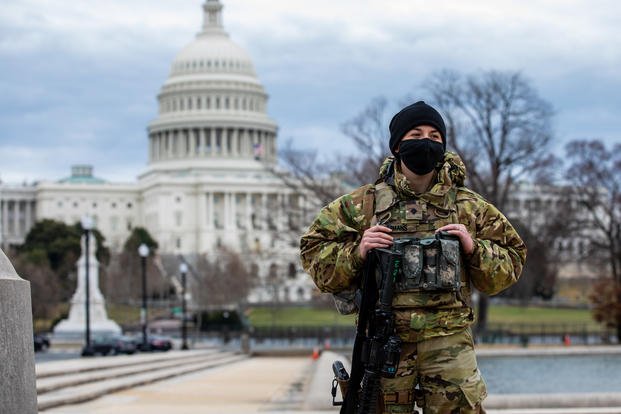The U.S. Capitol Police chief will be able to more quickly ask for the National Guard's help in an emergency under a bill signed Wednesday by President Joe Biden.
The chief will now be able to "unilaterally" request assistance from the D.C. National Guard or federal law enforcement agencies without prior approval from the Capitol Police Board, streamlining a process that lawmakers have identified as one of the reasons for the Guard's slow response during the Jan. 6 Capitol attack.
The bill passed both chambers of Congress earlier this month in voice votes.
Read Next: Pentagon Plan to Fight Extremism in the Ranks Is a Start, But Experts Say Problems Loom
"January 6th showed us that every minute counts during an emergency," Sen. Amy Klobuchar, D-Minn., the bill's sponsor, said in a statement after the Senate passed the measure. "Our report found that Capitol Police officers and their law enforcement partners were left alone to defend the Capitol and our democracy itself from violent insurrectionists, while the chief of the Capitol Police was delayed in obtaining approval to request help from the National Guard."
Klobuchar was referring to a report released jointly by the Senate Rules Committee she chairs and the Senate Homeland Security Committee earlier this year about the Jan. 6 attack on the Capitol by supporters of then-President Donald Trump while Congress was certifying Biden's electoral victory.
The report found that "the need to await Capitol Police Board approval during an emergency hindered the ability to request District of Columbia National Guard ("DCNG") assistance quickly."
The board is a four-member panel with oversight of the police force and is composed of the Senate and House sergeants-at-arms, the architect of the Capitol and, in a non-voting capacity, the police chief.
"Our bipartisan investigation into the response failures on January 6th clearly demonstrated the need for the Chief of the U.S. Capitol Police to have more unilateral flexibility to quickly request assistance in an emergency," Sen. Roy Blunt, R-Mo., the ranking member of the Rules Committee and co-sponsor of the bill, said in a statement this month. "This bipartisan bill addresses a major security challenge that was evident on January 6th, and is part of our ongoing effort to strengthen Capitol security moving forward."
Questions have also persisted about whether the Pentagon delayed the Guard's response during the attack.
In March testimony to the Senate, retired Maj. Gen. William Walker, who was the commanding general of the D.C. National Guard at the time of the attack, said Pentagon officials' concerns about "optics" and "unusual" restrictions that prevented deploying a quick reaction force without higher approval delayed the response. Under the timeline he laid out during his testimony, it took more than three hours to get approval to deploy Guard troops after the Capitol Police requested help.
But a Pentagon inspector general report released last month said Walker was given approval to deploy earlier than he suggested in his testimony and that then-Army Secretary Ryan McCarthy had to call Walker a second time a half-hour after the initial approval to reissue the deployment order. Overall, the IG report found that Pentagon officials "did not delay or obstruct the DoD's response" to the attack.
The House committee investigating Jan. 6 is in part seeking answers about the National Guard response, as highlighted in its recent contempt proceeding against former White House Chief of Staff Mark Meadows.
According to a committee report detailing its reasons for holding Meadows in contempt of Congress, he sent an email Jan. 5 promising an organizer of the rally that preceded the violence that National Guardsmen would be on hand Jan. 6 "to 'protect pro Trump people' and that many more would be available on standby."
-- Rebecca Kheel can be reached at rebecca.kheel@military.com. Follow her on Twitter @reporterkheel.
Related: What Did the National Guard Do? Jan. 6 Probe Hones In on Guard Response














